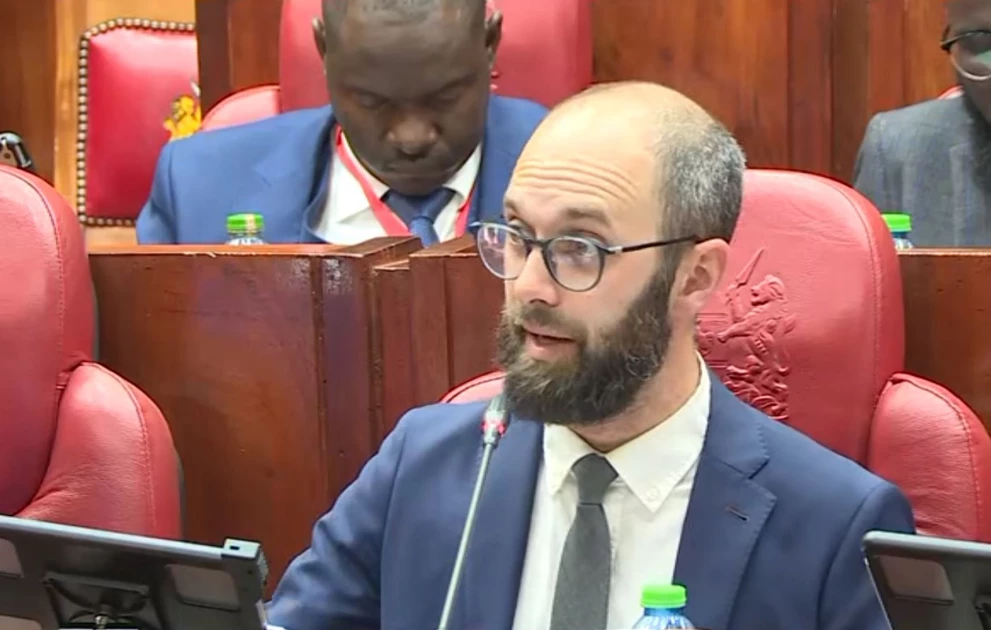Worldcoin has been scanning Kenyans' eyeballs since 2021, officials tell Parliament

Sam Sadle, the Head of Government Relations and Public Policy at Tools For Humanity appears before the Parliamentary Ad Hoc Committee on September 6, 2023.
Worldcoin,
the cryptocurrency project by US generative Artificial Intelligence (AI)
company OpenAI, says it has been conducting iris scans in Kenya way
before the project’s June rollout.
The crypto
project was suspended in Kenya on August 2 over data security concerns amid a
hysterical uptake as Kenyans scanned their eyeballs with the
Worldcoin Orb as proof of humanity against their online identities.
On
Wednesday, officials from the project’s partner Tools For Humanity (TFH)
appeared before the Parliamentary Ad Hoc Committee to be grilled on
the crypto project’s operations.
TFH is the Germany-based
global hardware and software company that led the initial development of the
Worldcoin protocol.
Sam Sadle,
the Head of Government Relations and Public Policy at TFH, said the company has
been scanning people’s irises in Nairobi and other Kenyan urban centres since
2021 when they were piloting the project.
“Prior to
July 24th, we have been providing proof of humanness verification
since 2021. We were located in more than 20 locations in the city, including
malls; The Hub, Sarit Centre, Imaara Mall and elsewhere,” Sadle told the committee.
“We
believe we reached a broad stratum of people across the country.”
The Worldcoin project rolled out globally on June 24. But despite its ambitions of a decentralised global currency, the project was met with privacy concerns and questions about the security of the biodata the company was collecting from Kenyans.
This
was heightened by the fact that new members were getting 25 free cryptocurrency
tokens after the verification process, valued at Ksh.8,256 at
the time.
The government stopped all activities associated with
the crypto project until relevant agencies certify the absence of any
security risks.
On
Wednesday, Alex Blania, the project’s CEO who co-founded it with OpenAI
CEO Sam Altman said the
free grants were to incentivise Kenyans to adopt the project.
“You
remember when PayPal launched it gave 20 USD to users because the platform is
only useful when you have money to transact,” Blania told the House
committee, referring to the US financial technology platform that allows the transfer
of money among people via web services and email.
Tools For
Humanity’s Chief Legal Officer Thomas Scott said they also piloted the project
in Chile and Portugal countries for three years ahead of their launch in June.
Asked why
they chose Kenya, Scott cited the country’s level of tech adoption.
“The level
of tech adoption, talent, political stability and integrity here, we thought
that this was a place alongside Chile and Portugal where the ideas alongside
the technology could be tested to be improved,” he said.
“We hoped
to find people who would adopt and champion it.”
Central
Bank of Kenya Governor Kamau Thugge, appearing before the committee on Tuesday,
submitted that CBK did not take part in licensing or clearing the proprietors
of Worldcoin.
Njoroge also disclosed that the lender had no knowledge of Worldcoin’s activities in the country.
But Worldcoin has maintained they have been in touch with the Office of the Data Commissioner since April 19, 2022, where it was registered as a data controller and not a limited company.
Despite its clampdown in Kenya, Worldcoin has been rolling out in Germany and France, among other countries. The company says on its website it has recorded 2,279,884 sign-ups and verifications across 34 countries.
It has not been
without backlash, though; the project is also under scrutiny in Europe for
running afoul of strict General Data Protection
Regulations (GDPR) in EU member states.
The United Kingdom’s Information Commission Office said it would be “making enquiries” about Worldcoin, while France's privacy watchdog CNIL said the legality of the project’s biometric data collection "seems questionable."
Want to send us a story? SMS to 25170 or WhatsApp 0743570000 or Submit on Citizen Digital or email wananchi@royalmedia.co.ke
Comments
No comments yet.



Leave a Comment